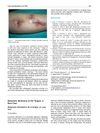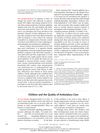 4 citations,
June 2013 in “The Journal of Rheumatology”
4 citations,
June 2013 in “The Journal of Rheumatology” The document concludes that various findings in rheumatology offer insights into disease severity, treatment responses, and potential risks in medication, with some limitations due to unspecified participant numbers.
 3 citations,
October 2019 in “Dermatologic Therapy”
3 citations,
October 2019 in “Dermatologic Therapy” Hair loss in men is mainly caused by hormones and genes, and while current treatments can slow it down, they can't fully stop it.
 3 citations,
February 2018 in “Journal of evolution of medical and dental sciences”
3 citations,
February 2018 in “Journal of evolution of medical and dental sciences” Some ovarian tumors can cause masculinization, and it's important to check for various causes when this symptom is present.
 1 citations,
January 2024 in “International Journal of Advanced Research in Science, Communication and Technology”
1 citations,
January 2024 in “International Journal of Advanced Research in Science, Communication and Technology” Herbal hair scrubs can effectively prevent and treat hair problems, boosting self-confidence.
 1 citations,
October 2022 in “International journal of endocrinology”
1 citations,
October 2022 in “International journal of endocrinology” Dihydrotestosterone changes some hormone-related gene expressions in rat pituitary glands but doesn't affect the estrous cycle.
 1 citations,
September 2020 in “Cochrane library (CD-ROM)”
1 citations,
September 2020 in “Cochrane library (CD-ROM)” The analysis aims to identify the most effective and safest treatments for alopecia areata.
 1 citations,
August 2020 in “Food Research”
1 citations,
August 2020 in “Food Research” Plant extracts like Avicennia marina, Boehmeria nipononivea, and Camellia sinensis could potentially treat hair loss with fewer side effects than synthetic drugs.
 1 citations,
December 2010 in “InnovAiT”
1 citations,
December 2010 in “InnovAiT” The document concludes that accurate diagnosis and appropriate management are crucial for treating various hair disorders, which have significant psychological impacts.
 November 2024 in “Benha Journal of Applied Sciences”
November 2024 in “Benha Journal of Applied Sciences” Reduced alpha smooth muscle actin may cause hair loss in androgenetic alopecia.
 May 2024 in “Research Square (Research Square)”
May 2024 in “Research Square (Research Square)” PCOS increases sexual pain distress in infertile women.
 November 2023 in “Research Square (Research Square)”
November 2023 in “Research Square (Research Square)” Combining calcipotriol and PRP is most effective for treating Alopecia Areata.
 September 2023 in “Asian journal of beauty & cosmetology”
September 2023 in “Asian journal of beauty & cosmetology” Lipids are important for healthy hair, but their exact role is not fully understood and needs more research.
 June 2023 in “Dermatology and therapy”
June 2023 in “Dermatology and therapy” The Middle East and Africa need better data, treatment consensus, and support for Alopecia Areata.
 March 2023 in “Zdorov'â čolovìka”
March 2023 in “Zdorov'â čolovìka” Certain medications can reduce sexual desire and function, especially in women.
 October 2022 in “Gadua Journal of Pure and Allied Science”
October 2022 in “Gadua Journal of Pure and Allied Science” Terbinafine is the most effective treatment for tinea capitis, a scalp infection often confused with other conditions.
 September 2022 in “Intisasi sains media”
September 2022 in “Intisasi sains media” A young child with complete hair loss improved significantly with a combination of hair growth treatments and laser therapy.
 January 2022 in “Clinical dermatology open access journal”
January 2022 in “Clinical dermatology open access journal” Early-stage Alopecia Areata was effectively treated in less than six months.
 December 2021 in “Razrabotka i registraciâ lekarstvennyh sredstv”
December 2021 in “Razrabotka i registraciâ lekarstvennyh sredstv” The gel form of substance Y is the most effective for treating hair loss.
 June 2018 in “Acta Scientiae Veterinariae”
June 2018 in “Acta Scientiae Veterinariae” Tailored treatment plans are crucial for managing canine dermatomyositis-like disease.
 April 2015 in “Cambridge University Press eBooks”
April 2015 in “Cambridge University Press eBooks” Many women experience sexual dysfunction, but few seek help, and better treatment and medical training are needed.
 November 2012 in “Actas Dermo-Sifiliográficas”
November 2012 in “Actas Dermo-Sifiliográficas” An 86-year-old man had a rare tongue melanoma but refused treatment, showing the need for early cancer detection and treatment.
 January 2012 in “Elsevier eBooks”
January 2012 in “Elsevier eBooks” New treatments for skin and hair repair show promise, but further improvements are needed.
 April 2011 in “Global journal of health science”
April 2011 in “Global journal of health science” Aldactone effectively reduces hair thickness in women with excessive hair growth, both alone and with other treatments.
 April 2011 in “Global journal of health science”
April 2011 in “Global journal of health science” Spironolactone effectively makes hair shafts thinner in women with excessive hair growth.
 February 2009 in “Springer eBooks”
February 2009 in “Springer eBooks” Pregnancy can cause more body and scalp hair growth and make nails brittle, but these changes often revert after giving birth.
 March 2022 in “Brazilian Journal of Health Review”
March 2022 in “Brazilian Journal of Health Review” COVID-19 can cause a type of hair loss that usually starts 3-6 months after the illness, and treatment includes stress reduction and hair care products like Minoxidil.
 January 2019 in “Kocaeli tıp dergisi”
January 2019 in “Kocaeli tıp dergisi” People with chronic hair loss may have a higher chance of Vitamin B12 deficiency.
 September 2018 in “The Medical Journal of Cairo University/The Medical Journal of Cairo University”
September 2018 in “The Medical Journal of Cairo University/The Medical Journal of Cairo University” Polarized light therapy helps hair regrowth in alopecia areata patients.
 January 2008 in “The New England Journal of Medicine”
January 2008 in “The New England Journal of Medicine” Children receive less than half of recommended health care, and routine hormonal testing for female-pattern hair loss is unnecessary without other androgen excess symptoms.
 June 2021 in “Archives of Advances in Biosciences”
June 2021 in “Archives of Advances in Biosciences” Finasteride reduces sperm count and quality and alters hormone levels in mice.





























